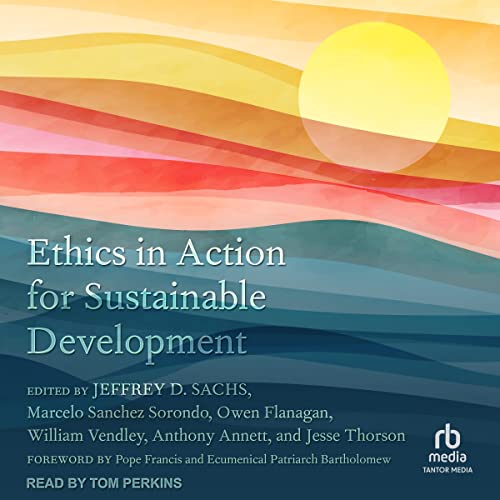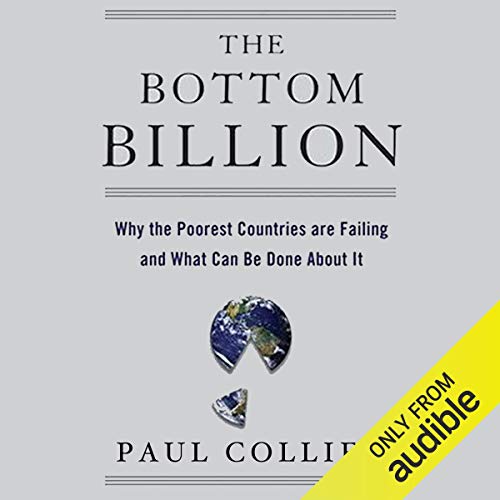
 Audible sample
Audible sample  Playing...
Playing... 
 Paused
Paused  Your audiobook is waiting!
Your audiobook is waiting!
Enjoy a free trial on us
$0.00$0.00
- Click above for unlimited listening to select audiobooks, Audible Originals, and podcasts.
- One credit a month to pick any title from our entire premium selection — yours to keep (you'll use your first credit now).
- You will get an email reminder before your trial ends.
- $14.95$14.95 a month after 30 days. Cancel online anytime.
Buy
-12% $17.72$17.72
Common Wealth: Economics for a Crowded Planet
 Audible Audiobook
– Unabridged
Audible Audiobook
– Unabridged
“Lucid, quietly urgent, and relentlessly logical . . . this is Bigthink with a capital B.”—The New York Times Book Review
“Common Wealth explains the most basic economic reckoning that the world faces.”—Al Gore, winner of the 2007 Nobel Peace Prize and former vice president of the United States
In Common Wealth, Jeffrey D. Sachs—one of the world's most respected economists and the author of The New York Times bestseller The End of Poverty—offers an urgent assessment of the environmental degradation, rapid population growth, and extreme poverty that threaten global peace and prosperity. Through crystalline examination of hard facts, Sachs predicts the cascade of crises that awaits this crowded planet—and presents a program of sustainable development and international cooperation that will correct this dangerous course. Few luminaries anywhere on the planet are as schooled in this daunting subject as Sachs, and this is the vital product of his experience and wisdom.
- Listening Length12 hours and 30 minutes
- Audible release dateJanuary 12, 2009
- LanguageEnglish
- ASINB001QKBHWS
- VersionUnabridged
- Program TypeAudiobook
 Read & Listen
Read & Listen
Get the Audible audiobook for the reduced price of $9.49 after you buy the Kindle book.
People who viewed this also viewed
- Audible Audiobook
- Audible Audiobook
- Audible Audiobook
- Audible Audiobook
- Audible Audiobook
People who bought this also bought
- Audible Audiobook
- Audible Audiobook
- Audible Audiobook
- Audible Audiobook
- Audible Audiobook
Related to this topic
- Audible Audiobook
- The Well-Tempered City: What Modern Science, Ancient Civilizations, and Human Nature Teach Us About the Future of Urban Life
 Audible Audiobook
Audible Audiobook - Audible Audiobook
- The Third Industrial Revolution: How Lateral Power Is Transforming Energy, the Economy, and the World
 Audible Audiobook
Audible Audiobook - Audible Audiobook
Product details
| Listening Length | 12 hours and 30 minutes |
|---|---|
| Author | Jeffrey D. Sachs |
| Narrator | Malcolm Hilgartner |
| Whispersync for Voice | Ready |
| Audible.com Release Date | January 12, 2009 |
| Publisher | Penguin Audio |
| Program Type | Audiobook |
| Version | Unabridged |
| Language | English |
| ASIN | B001QKBHWS |
| Best Sellers Rank | #322,937 in Audible Books & Originals (See Top 100 in Audible Books & Originals) #88 in Environmental Economics (Audible Books & Originals) #172 in Environmental Public Policy #1,460 in Development & Growth Economics (Books) |
Customer reviews
Customer Reviews, including Product Star Ratings help customers to learn more about the product and decide whether it is the right product for them.
To calculate the overall star rating and percentage breakdown by star, we don’t use a simple average. Instead, our system considers things like how recent a review is and if the reviewer bought the item on Amazon. It also analyzed reviews to verify trustworthiness.
Learn more how customers reviews work on Amazon-
Top reviews
Top reviews from the United States
There was a problem filtering reviews right now. Please try again later.
A must-read for all who want to make a difference.
Sachs is obviously a liberal with a grandiose plan that many will call utopian. He has been famously criticized by conservatives such as William Easterly in The White Man's Burden . Conservatives are not keen on large-scale plans in general, and they are generally cynical about what governments and humanitarian aid agencies can accomplish. However, in spite of their differences, Sachs and Easterly share some common ground. They both believe that small targeted projects that are either monitored or bypass corrupt government officials can be effective. Sachs is at his best when he draws on work done at the Earth Institute, of which he is director. The scientific farming techniques that he advocates are essential to the survival of the human race that is becoming predominantly urban.
Eradicating poverty is in everyone's interest since it slows down population growth. If the global population continues to grow at its current rate, reaching 10 billion at mid-century, our resources will be depleted. It is unrealistic for national governments or international organizations to try and control population growth. Only with economic security and widely distributed wealth will populations levels stabalize.
Sachs argues in the final chapter (The Power of One) that global cooperation is needed to solve the problems of poverty, overpopulation, pandemics, pollution, climate change, and scarcities of water, arable land and resources. This sounds naive and utopian but it is also true. National governments, however, will only be looking at their own short-term interests. But as environmental catastrophes start to mount, whether it's food shortages or rising sea-levels, governments will take action, but by then it might be too late.
Top reviews from other countries
1環境の保護
2人口の安定
3格差の是正と極度の貧困の終焉
の3つで、これらはお互いに密接に絡み合っています。問題は一つの国家のアクションによっては解決できず、世界的な協力関係によってのみ解決できるものだと彼は主張します。
上の3つの問題の解決は、継続可能な発展(Sustainable Development)につながるものです。 Sustainable Developmentは、上の3つの問題が適切に解決されてこそ実現が可能になります。 Sachs氏は、正しい方法をとれば、Sustainable Developmentは達成可能であると説きます。
環境の保護
科学技術の発展と、人口増加、一人当たり生産量の増加にともない、人類が地球環境に与えうるインパクトは年々増大しています。 すべての人が、現状を永続させることは不可能であることを知っています。 この30年で、脊髄動物の種はなんと半減しています(ところで、映画Earthはとてもよいですね)。 砂漠化も多くの地域で進み、十分に水が供給されない地域が増え、他方では水面の上昇により水没の危機にある国も増えています。 気温の上昇は、天災を増加させ、同時に新たな類の病気が蔓延する原因ともなっています。
これらの解決のためには、市場システムをうまく活かした政策の導入、規制、技術革新、食糧流通システムの効率化などが強く求められています。
人口の安定
人類の人口は、指数的に増加しています。西暦0年から1700年ごろまで、地球の人口は常に10億以下でした。それが、今や60億人。そして、現状が続けば、人口は2050年までに90億になる事が予想されています。継続可能な発展を達成するためには、これは80億以下に抑える必要があります。
人口の増加は、貧困の罠(自力では貧困から抜け出せなくなる状況)と密接に関わっています。最貧国における高い出生率は、幼児の高い死亡率に一因があります。しかし、高い出生率は、家庭が貧困から抜け出すことをより困難にし、それはその国家の経済成長を低下させ、他の国家にも影響を与えることになります。
人口の安定のためには、出生率を下げるインセンティヴを導入する必要があります。現に、先進国で多少の個別差がありながらも出生率が低いのは、インセンティヴによるものが多いのです(低い死亡率、高い養育費など)。途上国において出生率を下げるためにとるべきアクションは、医療制度を発展させ子供の死亡率を下げること(これには援助が必要です)、女の子の進学率を上げ、同時に女性の社会発展を促進することなどにあります。
格差の是正と極度の貧困の終焉
いまだに、世界の人口の6分の1である10億人は極度の貧困の中に生きていて、そのうち数百万人が毎年貧困のために亡くなっています。アフリカでは、5歳以下の幼児の死亡率は17.9%になります。 世界における幼児の死者数は毎日26,000人ですが、このうち3分の1は、ほんの少しのお金があれば(例えば蚊帳一つあれば)防げるものです。
お金があれば幸せになれるわけではありませんが、ない状態で幸せになる事は難しい。また、貧困は、政治不安や紛争、テロの温床にもなりえます。
貧困を解決するための基本的な処方箋は、以下のものになります。 まずは、人口を適切な水準に保つこと。 そして、そのうえで農業生産性を向上させ、社会インフラを整備し、民間部門主導の発展を促進するための技術の支援などを行う事にあります。
これにも多くのお金が必要です。 Sachs氏は、援助の必要性を説いています。 Easterlyは、これまでの多くの援助がまったくの無駄だったと説き、その原因はインセンティヴを考慮しなかったことによると主張していますが、Sachs氏は援助が事実無駄に使われうる事に同意しながらも、その無駄な援助は多くの場合先進国による「援助のための援助」であったこと、正しい方法によって運営された援助は、大きな効果をもたらしてきたことを話します。 特に、日本の開発援助が東・南アジアの国々の発展に大きく寄与してきたことを高く評価しています。
貧困の撲滅は、先進国が自らの収入の2.4%を毎年援助することによって達成することができるとSachs氏は主張します。アメリカの軍事費二日分で、アフリカ全土のマラリア対策費1年分を賄う事が出来るそうです。(そんな簡単なものではないと思いますが)軍事費の見直しを少しばかりすれば、貧困の撲滅のための資金は十分に拠出することが可能です。
現在、いくつかの国でMillennium Village Projectが進められています。 これは、村単位で農業・医療保険・教育などを発展させることにより経済開発に成功したロールモデルを数多く生み出しています。この経験を国家単位に適切に活かすことができるのであれば、2025年前に極度の貧困(1日に1ドル以下で生活すること)を撲滅させるMillennium Promiseを達成することは可能になるでしょう。
アクションの必要性
最初にも書いたように、僕たちがいま直面している問題は、より世界的な問題であり、皆の協力によってのみ乗り越えられるものになっています。政府のみならず、企業、NGOなど,大学・研究機関らの組織の連携がうまくいってこそ、問題は解決に進めることができます。
また、個人レベルでも今すぐにできることがあると、Sachs氏は話します:
・まず、僕たちの世代が直面している問題を認識すること
・各地に旅行して、現実を見ること
・永続可能な発展の実現のためにアクションをしている組織に自分も入ること
・周りの人々を巻き込むこと
・インターネットを活用して、永続可能な発展について知らせること
・自分の属している企業や、政府に働きかけること
・Millennium Promiseのスタンダードに沿って生活を送るようにすること
Jeffrey Sachsの地に足付いた楽観主義には本当に感じるところが多いです。僕も、いつまでもこうありたいと思います。まずは、自分ができるところから、少しずつでも着実にやっていこうと思います。


















